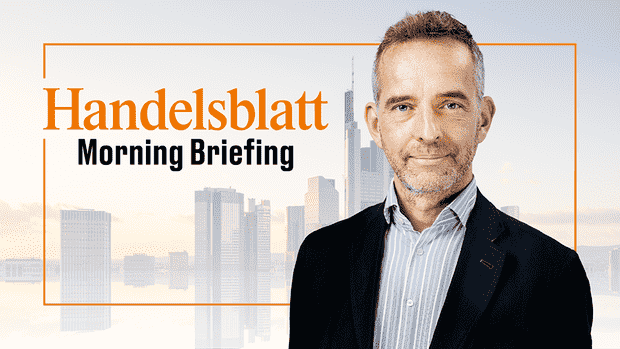Good morning dear readers,
A contagious disease is currently rampant in German companies – sparitis. Signs of infection provide phrases like:
- “We have put the filling of the position on hold for the time being.”
- “We would be ready to go, but the customer does not approve the budget.”
- “We’re trying to do this with on-board resources first.”
The extent of the austerity can be statistically corroborated by figures from the law firm Freshfields, which are exclusively available to the Handelsblatt. For fear of a recession, companies in Germany have accumulated 765 billion euros in cash and short-term deposits – more than ever before. The absolute growth between January and September was 49.5 billion euros, only in the Corona year 2020 was it higher. The Freshfields survey is based on statistics from the Bundesbank and the European Central Bank on the deposits of more than one million companies.
Top jobs of the day
Find the best jobs now and
be notified by email.
Typical trigger of austerity: worries about the future. Many companies are rather pessimistic about the coming year, wanting to keep their liquidity as an emergency buffer, are therefore putting the brakes on costs and putting investments on hold. Other groups are also soaking up liquidity because they see a particularly high need for investment in the coming year, for example to switch to green energy supply or to take over weakened competitors.
Note: Ask your management consultant or auditor about therapy options.
Staying on the subject of health: The system of case flat rates in Germany ensures that small hospitals sometimes offer complicated operations in order to generate income. However, they do not come up with the necessary number of cases to offer reliably high quality.
In its current “Quality Report”, the Scientific Institute of the AOK (WIdO) has ascertained how serious the deficit actually is. The report is exclusively available to the Handelsblatt in advance.
(Photo: Bloomberg)
In 2020, every fifth breast cancer patient was treated in a clinic with fewer than 25 cases per year. In 2016 it was just under every fourth. “You have to keep in mind that 25 surgeries per year correspond to about one procedure every two weeks,” explains Jürgen Klauber. The WIdO managing director continues:
Under these circumstances, one cannot assume that there is a well-coordinated team with sufficient routine and a well-coordinated process chain. The result of this, according to Klauber, “occasional surgery”: more deaths than necessary.
After all, a clinic reform initiated by Health Minister Karl Lauterbach also aims to ensure that complex treatments will only be carried out in specialized clinics with a correspondingly high number of cases in the future.
Yesterday I reported here about the interview that our US team conducted with the founder of the insolvent crypto exchange FTX. Now Sam Bankman-Fried was surprisingly arrested in the Bahamas. This was announced by the responsible Attorney General Ryan Pinder.
The move was taken because the United States had filed a criminal lawsuit against the 30-year-old Bankman-Fried and could demand his extradition, the statement said. There are allegations of fraud in the billions. Bankman-Fried admitted to mistakes in an interview with the Handelsblatt, but denied criminal responsibility.
A registered association in Germany needs at least seven members. The legal form would therefore fit in well with the climate club of the G7 countries, the foundation of which Chancellor Olaf Scholz has promoted in recent months.
Yesterday, the heads of state and government of the seven most important Western economic powers passed a statute. The idea: countries with great ambitions to work together on climate protection, for example through…
- coordinated CO2 prices
- a common market for CO2-free products
- a coordinated fight against industrial relocation due to carbon costs
In the best case, the example of the G7 countries should have an inspiring effect on other countries, which can then join the climate club. Sounds like a good idea – which now only needs to be filled with content.
A large majority of EU countries agreed yesterday evening to freeze payments from the EU budget earmarked for Hungary. However, the blocked sum should not be as high as proposed by the EU Commission, several diplomats from the German Press Agency confirmed after a meeting of the permanent representatives of the member states in Brussels. Instead of 7.5 billion, only 6.3 billion euros are to be frozen until the right-wing government of Prime Minister Viktor Orban has fully implemented its promises to uphold the rule of law.
The EU states have also agreed on a directive on the international minimum tax. The aim of the directive is to prevent corporate profits from being shifted to tax havens. International companies with at least 750 million euros in sales per year should therefore pay at least 15 percent tax, regardless of where they are based.
And then there is Manuel Göttsching, pioneer of electronic music, who, as was announced yesterday, died on December 4th. Are you feeling a bit philistine now because the gentleman’s name means nothing to you? I didn’t know him either until yesterday evening when I read his obituary in the “Süddeutsche Zeitung” and spontaneously had Göttsching’s key work “E2-E4” from 1981 accompany me musically while writing this morning briefing. According to “Süddeutsche”, a “meditation on two chords around which sequencer and drum computer motifs meander”. And an anticipation of a lot of ambient and techno music that came about in the decades that followed.
Impressive how some people in West Berlin spent their time while the rest of the republic was listening to “The Smurfs Hit Parade”. In 1981 it was at the top of the German album charts for nine weeks.
I wish you a day with a successful opening.
Best regards
Her
Christian Rickens
Editor-in-Chief Handelsblatt


